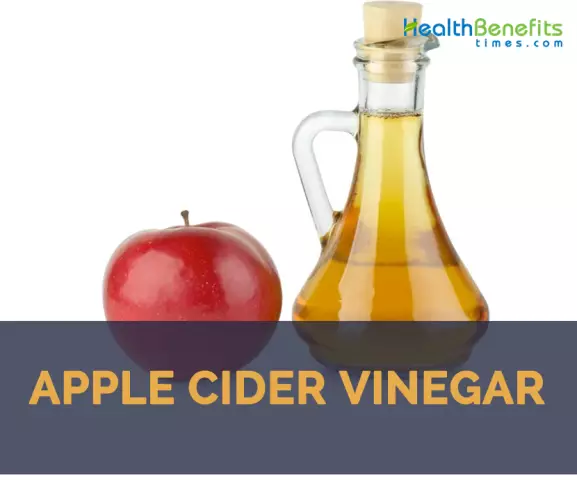- Author Rachel Wainwright [email protected].
- Public 2023-12-15 07:39.
- Last modified 2025-11-02 20:14.
Wine vinegar
Description of wine vinegar

Wine vinegar (otherwise - grape) refers to products known and used for a long time both for treatment, and in cooking and for cosmetic purposes. According to some historical sources, wine vinegar rivals wine in antiquity, since the earliest mentions of it date back to 5000 BC. e.
They began to actively use it in antiquity, adding it to sauces and marinades. At the same time, the property of wine vinegar was noted to improve the structure of the hair and make the skin smooth and velvety. As a medicine, it was used to treat digestive disorders, as well as for gout and vitamin deficiency.
There are several techniques for making wine vinegar. Sometimes damaged berries and grape pomace are used as raw materials, which are fermented with yeast and allowed to brew for several months.
Wine and apple cider vinegar are among the most popular and common fruit vinegars. The medicinal benefits of their use in the daily diet have been confirmed by various studies, and now fruit vinegar is popular both in Europe and in Asia. Their most important advantages include the fact that they are saturated with antioxidants, which help prevent premature aging.
In the Mediterranean and Central European countries, wine vinegar is used most often. It is made from both white and red grapes.
Traditional Ayurveda, along with coffee, tea, onions and garlic, classifies wine vinegar as a rajasic product that increases human activity in all areas of his activity.
The composition and useful properties of wine vinegar
Wine vinegar inherited many of its beneficial properties from grapes, which are a storehouse of various vitamins and valuable elements. Grapes are renowned for their ability to improve lung function, slow the aging process, cleanse arteries, prevent coronary heart disease and the development of certain cancers.
Wine vinegar contains lactic, tartaric, acetic, pantothenic and ascorbic acids, vitamins C and A, nicotinamide, as well as minerals such as potassium, fluorine, iron, magnesium, phosphorus and calcium.
Grape vinegar is good for digestion (especially with low or zero acidity of gastric juice) and has a beneficial effect on the functioning of the gallbladder, rectum and kidneys.
Wine vinegar contains a natural phytoalexin - resveratol, which is a powerful antioxidant and has anti-inflammatory, cardioprotective and antitumor effects on the body.
Potassium, which is part of grape vinegar, has a beneficial effect on the nervous system, destroys pathogenic bacteria, and also helps to strengthen hair and nails.
Another trace element that is included in sufficient quantities in wine vinegar - magnesium, stimulates the adrenal glands and heart.
The benefits of wine vinegar
Wine vinegar has been shown to lower cholesterol, fat and blood pressure levels, which minimizes the possibility of heart disease. This is possible thanks to the acetic acid, which is a part of wine vinegar. Also, thanks to acetic acid, the body's ability to absorb minerals, especially calcium, increases.
In addition, the benefits of wine vinegar for chronic fatigue have been noted.

Many studies in Europe have shown that wine vinegar significantly lowers the glycemic index. At the same time, he contributed to a decrease in the index even after a meal with a high carbohydrate content, such as white bread. This property of grape vinegar makes it an effective way to prevent type 2 diabetes and some forms of cardiovascular disease.
Applying wine vinegar
Wine vinegar is most widely used in cooking, and dishes with the addition of vinegar have many beneficial properties.
Natural wine vinegar goes well with meat and is used in marinades. So, in marinades, it is recommended to replace fatty and cholesterol-rich sauces with wine vinegar, which practically does not contain calories and carbohydrates. They can also replace cream and mayonnaise in salads, which will help to show the taste of all components and improve digestion.
Wine vinegar does not go well with fermented milk products, as well as baked or fried potatoes.
When preparing dishes according to recipes of oriental cuisine, rice vinegar, if necessary, can be replaced with grape vinegar.
Grape vinegar can be applied topically because it has astringent properties. It is used for cuts, bruises, and skin irritation. It is recommended to use white vinegar for the face, as it has whitening properties. Also, the use of wine vinegar is effective for sunburn.
Due to its antibacterial properties, wine vinegar can be used for cleaning and disinfecting dishes and household items.
Contraindications
Wine vinegar is contraindicated in case of allergy to grapes, as well as with increased acidity of gastric juice, stomach ulcer and gastritis.
Found a mistake in the text? Select it and press Ctrl + Enter.






